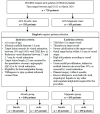Sex Differences in the Clinical Features and Outcomes of Patients with Acute Coronary Syndrome Treated with Two Generations (Absorb and Magmaris) of Bioresorbable Vascular Scaffolds
- PMID: 34501216
- PMCID: PMC8432059
- DOI: 10.3390/jcm10173768
Sex Differences in the Clinical Features and Outcomes of Patients with Acute Coronary Syndrome Treated with Two Generations (Absorb and Magmaris) of Bioresorbable Vascular Scaffolds
Abstract
Background: Despite the developments in percutaneous coronary interventions (PCI), women are still more likely than men to have unfavorable outcomes after PCI performed in Acute Coronary Syndrome (ACS). The mechanisms of this phenomena are not fully understood. Potential benefits of bioresorbable scaffolds (BRS) may be particularly expressed in the female population. Nevertheless, the data available currently are inconsistent and limited. This study evaluated the gender-related differences in the short-term clinical outcomes in ACS patients treated with implantation of two generations of BRS (first generation, Absorb; second generation, Magmaris).
Methods: The study was divided into two arms. To the first one, we qualified 160 patients with ACS treated with PCI who received 210 Absorb scaffolds. The second arm was composed of 193 patients with ACS who underwent PCI with Magmaris implantation.
Results: There were no significant sex-related differences in primary endpoints (cardiovascular-death, myocardial infarction, in-stent thrombosis) or principal secondary endpoints (of target-lesion failure, scaffold restenosis, death from any reason, other cardiovascular events) in either generation of BRS in a 1-year follow-up.
Conclusions: Both genders tended to have a similar outcome in routine clinical practice following BRS implantation due to ACS. The magnesium bioresorbable scaffold (Magmaris) early outcome seemed to be more favorable in comparison to the Absorb scaffold.
Keywords: Absorb; Magmaris; acute coronary syndrome (ACS); bioresorbable scaffold (BRS); coronary artery disease (CAD); gender-related prognosis; percutaneous coronary intervention (PCI); sex differences.
Conflict of interest statement
The authors declare no conflict of interest.
Figures

Similar articles
-
The 1-Year Safety and Efficacy Outcomes of Magmaris, Novel Magnesium Bioresorbable Vascular Scaffolds in Diabetes Mellitus Patients with Acute Coronary Syndrome.J Clin Med. 2021 Jul 18;10(14):3166. doi: 10.3390/jcm10143166. J Clin Med. 2021. PMID: 34300332 Free PMC article.
-
Outcomes of the two generations of bioresorbable scaffolds (Magmaris vs. Absorb) in acute coronary syndrome in routine clinical practice.Cardiol J. 2022 May 27;30(6):870-80. doi: 10.5603/CJ.a2022.0047. Online ahead of print. Cardiol J. 2022. PMID: 35621089 Free PMC article.
-
Early outcome of magnesium bioresorbable scaffold implantation in acute coronary syndrome-the initial report from the Magmaris-ACS registry.Catheter Cardiovasc Interv. 2019 Apr 1;93(5):E287-E292. doi: 10.1002/ccd.28036. Epub 2018 Dec 10. Catheter Cardiovasc Interv. 2019. PMID: 30537203
-
Magmaris: a new generation metallic sirolimus-eluting fully bioresorbable scaffold: present status and future perspectives.J Thorac Dis. 2017 Aug;9(Suppl 9):S903-S913. doi: 10.21037/jtd.2017.06.34. J Thorac Dis. 2017. PMID: 28894596 Free PMC article. Review.
-
Are acute coronary syndromes an ideal scenario for bioresorbable vascular scaffold implantation?J Thorac Dis. 2017 Aug;9(Suppl 9):S969-S978. doi: 10.21037/jtd.2017.06.136. J Thorac Dis. 2017. PMID: 28894603 Free PMC article. Review.
Cited by
-
C-Reactive Protein Level Predicts Cardiovascular Risk in Chinese Young Female Population.Oxid Med Cell Longev. 2021 Dec 1;2021:6538079. doi: 10.1155/2021/6538079. eCollection 2021. Oxid Med Cell Longev. 2021. PMID: 34900087 Free PMC article.
-
Magnesium Bioresorbable Scaffold (BRS) Magmaris vs Biodegradable Polymer DES Ultimaster in NSTE-ACS Population-12-Month Clinical Outcome.J Interv Cardiol. 2022 Dec 20;2022:5223317. doi: 10.1155/2022/5223317. eCollection 2022. J Interv Cardiol. 2022. PMID: 36605917 Free PMC article.
-
Mid-term safety and efficacy of magnesium bioresorbable vascular scaffolds - magmaris in diabetic population. 2-Years outcome in acute coronary syndrome cohort.Diab Vasc Dis Res. 2023 Jul-Aug;20(4):14791641231188705. doi: 10.1177/14791641231188705. Diab Vasc Dis Res. 2023. PMID: 37439002 Free PMC article.
-
Two-Year Outcomes for Patients with Non-ST-Elevation Acute Coronary Syndrome Treated with Magmaris and Absorb Bioresorbable Scaffolds in Large-Vessel Lesions.J Pers Med. 2024 May 17;14(5):540. doi: 10.3390/jpm14050540. J Pers Med. 2024. PMID: 38793122 Free PMC article.
-
Magnesium bioresorbable scaffold (Magmaris) versus polymer biodegradable ultrathin drug-eluting stent (Ultimaster) in acute coronary syndrome. Mid-term outcomes (2 years).Postepy Kardiol Interwencyjnej. 2024 Mar;20(1):67-75. doi: 10.5114/aic.2024.136901. Epub 2024 Mar 22. Postepy Kardiol Interwencyjnej. 2024. PMID: 38616930 Free PMC article.
References
-
- Dudek D., Siudak Z., Grygier M., Araszkiewicz A., Dąbrowski M., Kusa J., Hawranek M., Huczek Z., Kralisz P., Roleder T., et al. Interventional cardiology in Poland in 2019. Summary report of the Association of Cardiovascular Interventions of the Polish Cardiac Society (AISN PTK) and Jagiellonian University Medical College. Adv. Interv. Cardiol. 2020;16:123–126. doi: 10.5114/aic.2020.96054. - DOI - PMC - PubMed
-
- O’Neil A., Scovelle A.J., Thomas E., Russell J.D., Taylor C.B., Hare D.L., Toukhsati S., Oldroyd J., Rangani W.T., Dheerasinghe D.A.F., et al. Sex-Specific Differences in Percutaneous Coronary Intervention Outcomes After a Cardiac Event: A Cohort Study Examining the Role of Depression, Worry and Autonomic Function. Heart Lung Circ. 2020;29:1449–1458. doi: 10.1016/j.hlc.2020.03.001. - DOI - PubMed
-
- Nagumo S., Mori H., Maeda A., Akashi Y.J., Ako J., Ikari Y., Ebina T., Sato N., Tamura K., Namiki A., et al. Sex-Related Differences in In-Hospital Mortality in Japanese ST-Elevation Acute Myocardial Infarction Patients Presenting to Hospital in the 24 Hours After Symptom Onset―Results From K-ACTIVE―. Circ. Rep. 2019;1:313–319. doi: 10.1253/circrep.CR-19-0041. - DOI - PMC - PubMed
LinkOut - more resources
Full Text Sources
Miscellaneous

